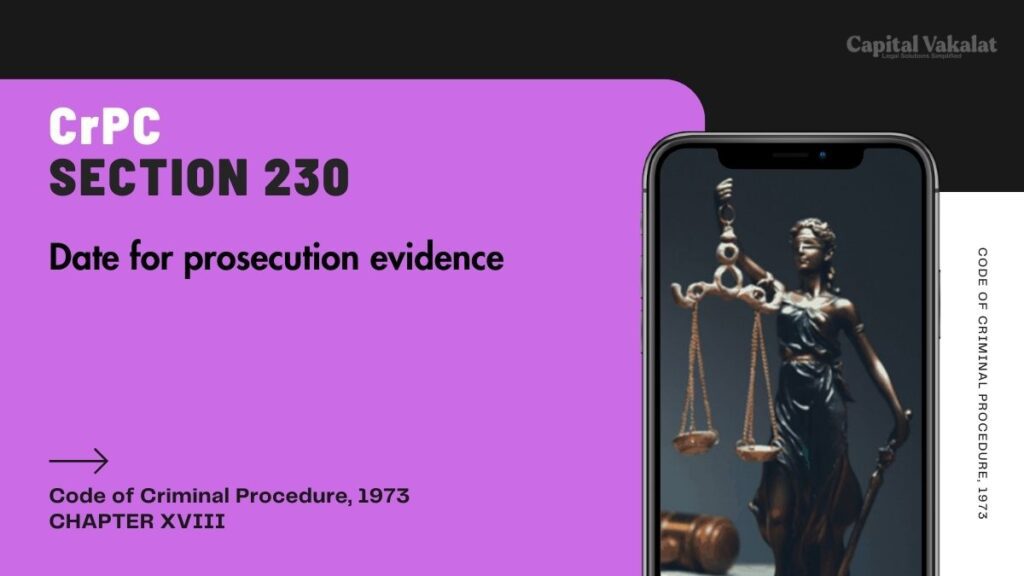The legal landscape of India is intricate and multifaceted, comprising numerous sections that guide the administration of justice. Among these, Section 230 of the Code of Criminal Procedure (CrPC) plays a pivotal role, particularly in relation to the date for prosecution evidence. This article delves into the nuances of Section 230 CrPC, elucidating its significance, procedural implications, and the broader context within which it operates. By the end of this exploration, readers will have a comprehensive understanding of this critical provision and its impact on the judicial process.

Section 230 of the Code of Criminal Procedure, 1973, is a vital provision that dictates the scheduling of prosecution evidence in criminal trials. This section ensures that the prosecution is given an appropriate opportunity to present its case while also balancing the rights of the accused to a fair and timely trial. Understanding the implications and applications of this section is crucial for legal practitioners, law students, and anyone interested in the criminal justice system.
Bare Act. Section 230 Cr.P.C.
Date for prosecution evidence.
If the accused refuses to plead, or does not plead, or claims to be tried or is not convicted under section 229, the Judge shall fix a date for the examination of witnesses, and may, on the application of the prosecution, issue any process for compelling the attendance of any witness or the production of any document or other thing.
Understanding Section 230 CrPC
The Provision in Detail
Section 230 CrPC falls under Chapter XIX, which deals with the trial of warrant cases by Magistrates. Specifically, it outlines the procedures to be followed when the Magistrate has issued an order under Section 227 (discharge) or framed charges under Section 228. The essence of Section 230 is to provide a timeline and framework within which the prosecution must present its evidence.
Importance of Timely Prosecution Evidence
The timely presentation of prosecution evidence is essential for several reasons:
- Ensuring Justice: A delay in presenting evidence can lead to prolonged trials, which may hamper the delivery of justice.
- Preserving Evidence Integrity: Timely evidence presentation helps in preserving the integrity and reliability of the evidence.
- Rights of the Accused: It safeguards the accused’s right to a speedy trial, a cornerstone of fair judicial practice.
Procedural Aspects of Section 230 CrPC
Issuing Dates for Prosecution Evidence
Under Section 230, once charges have been framed, the Magistrate is required to fix a date for the prosecution to produce its evidence. This step is crucial as it marks the commencement of the trial phase where the prosecution lays out its case against the accused.
Role of the Magistrate
The Magistrate’s role is to ensure that the trial proceeds in an orderly and timely manner. By setting specific dates for prosecution evidence, the Magistrate helps maintain the trial’s momentum and prevents unnecessary delays.
Adjournments and Delays
While the CrPC provides for adjournments under certain circumstances, Section 309 mandates that such delays should be minimized. The Magistrate must record reasons for any adjournment, ensuring that the trial’s integrity is upheld.
Challenges and Practical Considerations
Coordination Between Parties
One of the significant challenges in the implementation of Section 230 is coordinating between the prosecution and defense. Ensuring both parties are prepared and available on the scheduled dates can sometimes be problematic, leading to delays.
Handling Non-Compliance
Non-compliance with the stipulated dates for prosecution evidence can lead to complications. The Magistrate may have to take corrective measures, including imposing costs or other penalties to ensure adherence to the timeline.
Impact on Judicial Efficiency
Efficiently managing the dates for prosecution evidence directly impacts the overall judicial efficiency. Proper scheduling and adherence to timelines can significantly reduce the backlog of cases and expedite the delivery of justice.
Case Studies and Judicial Interpretations
Landmark Judgments
Various landmark judgments have interpreted and elucidated the provisions of Section 230 CrPC. These cases provide insights into how the courts have navigated challenges related to the scheduling of prosecution evidence.
Practical Applications
Examining real-world applications of Section 230 helps in understanding its practical implications. For instance, how courts balance the need for timely evidence presentation with the rights of the defense to adequately prepare their case.
Section 230 CrPC in Context
Comparison with Other Jurisdictions
Comparing the Indian approach with other legal systems provides a broader perspective on the importance of timely prosecution evidence. Different jurisdictions may have varied procedures, but the underlying principle of a fair trial remains constant.
Evolution Over Time
The interpretation and application of Section 230 have evolved, reflecting changes in judicial thinking and procedural requirements. Understanding this evolution helps in appreciating the current framework and its significance.
Conclusion
Section 230 CrPC is a cornerstone in the Indian legal system, ensuring that the prosecution presents its evidence within a stipulated timeframe, thereby facilitating a fair and timely trial. By understanding its provisions, challenges, and practical applications, legal practitioners and stakeholders can navigate the complexities of the criminal justice system more effectively. This section underscores the importance of balancing the rights of the prosecution and the defense, ultimately contributing to the efficient delivery of justice.